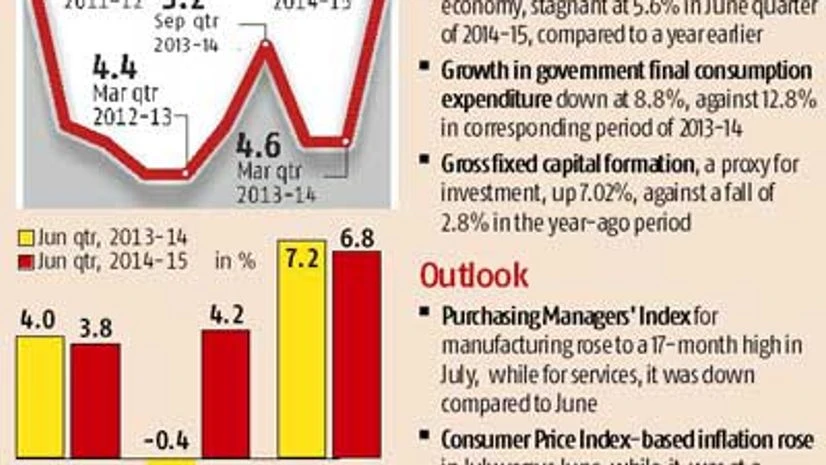For the June quarter of 2013-14, gross domestic product (GDP) had increased 4.7 per cent.
During the June 2014-15 quarter, the agriculture segment expanded 3.8 per cent, against 6.3 per cent in the previous quarter and four per cent in the corresponding period of 2013-14.
What primarily drove the economy in the June quarter was industry, which expanded 4.2 per cent, against contractions of 0.19 per cent in the previous quarter and 0.4 per cent in the corresponding period last year. The manufacturing sector expanded 3.5 per cent; this followed four consecutive quarters of contraction, suggesting a revival in business confidence. In the previous quarter, manufacturing contracted 1.4 per cent, while the decline in the June quarter of 2013-14 was 1.2 per cent.
The numbers will boost hopes the economy’s growth this financial year will exceed five per cent, after sub-five per cent growth in the previous two financial years.
The finance ministry expressed hope growth would pick up further in the remaining three quarters. “With the improvement witnessed in some important sectors, including manufacturing and exports (which registered growth of 11.5 per cent at 2004-05 prices), along with the measures taken by the government, the economy can be expected to show further improvement in the remaining part of the year,” it said.

However, the recovery in the coming quarters might be somewhat dampened by the agriculture segment, which is likely to be hit by an uneven monsoon, as well as the expected slowing of government-aided community, social and personal services to check fiscal deficit, cautioned YES Bank chief economist Shubhada Rao. The Centre’s fiscal deficit has already exceeded 10 per cent of GDP in the June quarter; for the April-July period, it accounted for more than 60 per cent of the Budget estimate for the entire financial year.
Rao pegged economic growth for 2014-15 at 5.4 per cent, with a little upside bias, against the government’s expectations of 5.8 per cent.
Even as the National Democratic Alliance was in charge at the Centre only for about a third of the quarter, Friday’s data might provide a breather to the government, which is drawing criticism for high inflation, particularly for essential commodities. Electricity generation rose 10.2 per cent, against 3.8 per cent in the year-ago period. In the quarter ended March this year, this segment had expanded 7.2 per cent.
The construction space expanded 4.8 per cent in the June quarter, against only 0.7 per cent in the previous quarter and 1.1 per cent in the year-ago period. The key indicators of construction, production of cement and consumption of finished steel, registered growth of 9.5 per cent and 0.7 per cent, respectively. During the quarter, the mining segment recorded growth of 2.1 per cent, following eight quarters of declines or stagnation.
Services, the biggest sector of the Indian economy, didn’t fare very well, rising 6.8 per cent, slightly higher than 6.42 per cent in the previous quarter. However, it was lower compared with the 7.2 per cent growth seen in April-June, 2013-14.
Trade, hotels, transport and communications, the largest segment of the services sector, primarily came in the way of good services growth; this segment expanded 2.8 per cent, against 3.9 per cent in the previous quarter and 1.6 per cent in the year-ago period.
“Agriculture and the trade and hotels segments of services were negative surprises,” Rao said.
Community, social and personal services expanded 9.1 per cent, significantly higher than 3.3 per cent in the previous quarter, largely explaining the strain on fiscal deficit. However, it was lower compared to the 10.6 per cent growth in the corresponding period of 2013-14.
Financial and other services, however, rose 10.4 per cent in the June quarter, the highest growth in any segment during this period. Growth in this segment was 12.4 per cent in the previous quarter and 12.9 per cent in the year-ago period.
Demand in the economy didn’t pick up much, as private final consumption expenditure growth was 5.6 per cent, the same as in the corresponding quarter last year. National Statistical Commission Chairman Pronab Sen attributed the slow growth in trade and hotels segment to low consumption demand in the economy. “Trade is completely linked to what is happening to the commodity economy, particularly consumption,” he said.
At seven per cent, growth in gross fixed capital formation, a proxy for investment, was high, against a fall of 2.8 per cent in the year-ago period. Rao said this was largely due to a low base, adding investment would gradually pick up from November-December.

)
